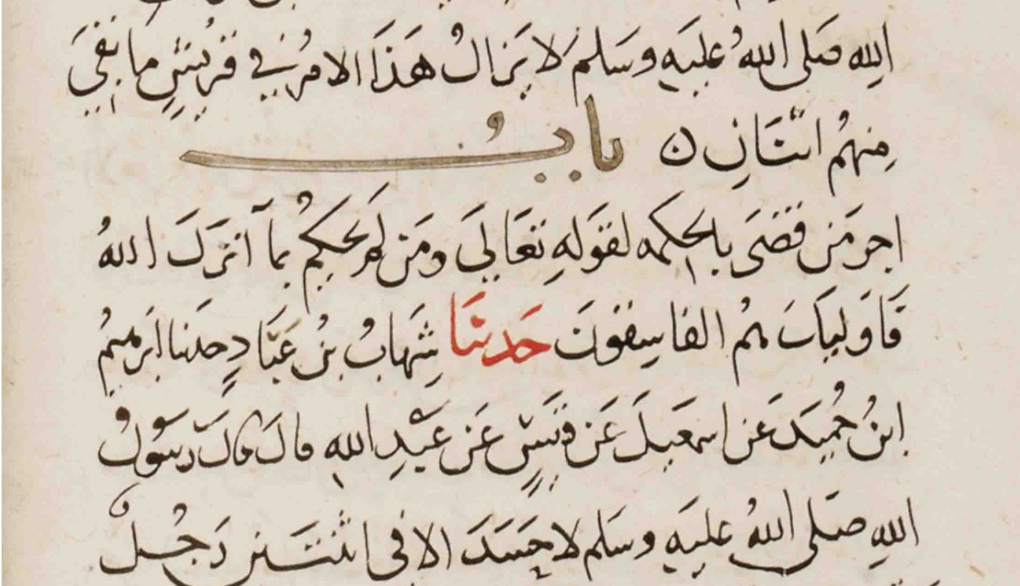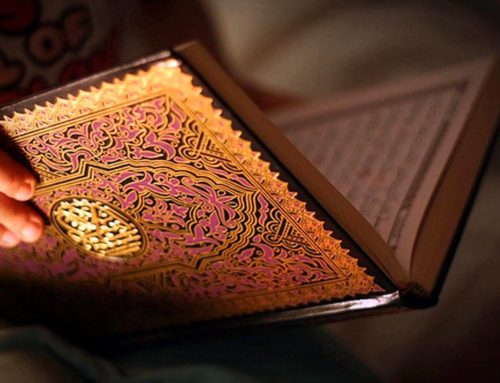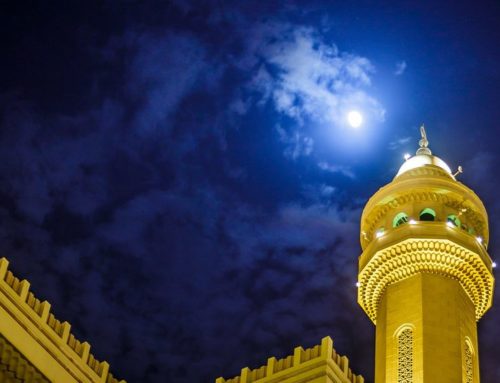Translated by Muhammad Hamood
Translator’s note: Following is a brief answer by Hakim al-Ummah Mawlana Ashraf ‘Ali Thanawi (d.1942) to a question posed by someone who tried to call into question the well-established fact that the Sahabah, may Allah be pleased with them, and the generations after them accurately preserved the words of the Hadith. The person who raised this question resembles the modern-day hadith denier who fails to appreciate the extraordinary abilities of the preservers of hadith due to his lack of knowledge of the hadith sciences or unwillingness to examine the proofs. Hakim al-Ummah Mawlana Thanawi, defends hadith preservation in this piece by pointing out the fallacies in this person’s argument, the premise of which is that the narrators of hadith could not possibly have memorized words so perfectly as that is not humanly possible. In his reponse, Hakim ul-Ummah Mawlana Thanawi has brought to light a unique perspective which, it is hoped, will further strengthen the seeker of knowledge’s understanding of hadith preservation.
(Question)
A person asks, “What is the proof for the hadith being preserved word for word? The cause for the preservation of wahi [1]Wahi is of two types: Matlu (Qur’an) and Ghayr Matlu (Hadith). The “wahi” in the question is referring to the Qur’an only and because Hadith is also a type of wahi, it seems like the person … Continue reading (revelation) is that the Noble Messenger (ﷺ) used to have it put in writing [by the scribes]. In regard to the hadith, though, it is inconceivable that whatever he (ﷺ) said, people would [not only] listen to it but after [merely] listening to it they were able to [also] memorize everything [he said] word for word. This is [difficult to fathom] because there are many hadiths that are quite lengthy such as the hadith of Mi‘raj [2]Mi‘raj refers to the ascension of the Prophet Muhammad (ﷺ) to the heavens.. Similarly, there are many hadiths in the Sihah [3]Sihah refers to the six authentic books of hadith, also referred to as the Sihah Sittah, which are as follows: Sahih Bukhari, Sahih Muslim, Sunan Abi Dawud, Sunan Nasa’i and Sunan Ibn Majah that are [also] quite lengthy. In regard to them it is believed that these are the exact words that the Messenger of Allah (ﷺ) spoke. For example, if an individual utters five to ten lines in front of a gathering and then asks [them], ‘what did I just say?’, no one in the gathering will be able to repeat, word for word, what he just said [4]This is an unsound opinion being presented as a “fact” by the questioner.. Like this, whatever Allah’s Messenger (ﷺ) used to say, it is inconceivable that the listeners remembered those exact same words and two hundred years later when the hadiths were compiled, those same words were transmitted exactly as they were.”
This person states that to claim that the words of the hadiths are precisely the same as they were [spoken by the Prophet (ﷺ)] is [claiming something that is] practically impossible. Please write a detailed and evidence-based answer to this —along with a response to this letter. [5]It seems that the question from the person raising doubts was included in a letter that was sent by an acquaintance of Hakim al-Ummah. Allah knows best.
(Answer)
This doubt that has been raised on the subject of hadith preservation is not new. People have been raising such doubts for ages, even Sayyid Sahib [6]Sir Syed Ahmad Khan (d.1898) of Aligarh, India would hold fast to raising such doubts in many discussions. However, after one thoughtfully considers [the following] few points, this doubt will absolutely vanish:
(1) The stories and incidents regarding the strength of the memories of the Sahabah and the Tabi‘un (Followers) are related to such an extent in history that when put together they are mutawatir al-ma’na (mass transmitted in meaning). Thus, Ibn ‘Abbas (may Allah be pleased with him) would repeat a qasidah (poetry) of hundred verses exactly as it were after listening to it only once. [The incident of] Imam Bukhari traveling to a certain place where hundreds of hadiths were presented to him in a disordered fashion and his relating them [back] as they were originally presented then his correcting them [all from memory] is famously known and mentioned.
If the doubt is raised that this type of [strong] memory is against inherent nature (khilaf-e-fitrat) therefore these stories are false, then first of all the limits and principles of this fitrah (inherent nature) have never been fully determined through which it can be understood whether something is in accordance with fitrah or not …
Secondly, no proof has ever been established to substantiate [the claim] that “things which are contrary to fitrah are impossible” and their occurrence is [likewise] completely impossible at some other time—anyway, this excuse is merely building an unsound opinion on top of another unsound opinion.
Thirdly, the following observational proof exists for this [i.e., possessing exceptionally strong memory and it] not being contrary to fitrah: In recent times, there used to be a Molwi Hafiz Rahmatullah—who happened to be blind—in Allahabad. Those who witnessed the incidents of his [strong] memory with their own eyes are still alive. Listening to these incidents astonishes one’s mind. How far can one go in denying this? Similar incidents are reported about Hafiz Muhammad ‘Azim Peshawari and a scholar from Rampur—who has recently passed away. This unworthy one has met those who have seen all three of these elders and has heard their incidents. [7]Modern researchers refer to this phenomenon as highly superior autobiographical memory (HSAM). Numerous people in recent times have also exhibited this type of exceptional memory (see this, this and … Continue reading
(2) When Allah Most High decides to use someone [for His cause] in a given time period, He—through His power and wisdom—creates the physical and intellectual abilities in the people of that time accordingly [so they can shoulder this cause]. This principle is also from the principles of fitrah. Just look at the strange and unique things being invented in our times! Why doesn’t one ask if possessing such [a high level of] intellect is contrary to fitrah or is it in accordance with it? If it is contrary to it then how did such occurrences [i.e., inventions] happen [in the first place]? And if it is in accordance with it then why did such [inventions] not occur at an earlier time? If it will be said that the [human] condition grows day by day then I say: This growth should be considered present in all human conditions because the essential nature of humans does not vary in individual members [i.e., it remains the same]. Furthermore, why is this [growth in human capabilities] specified for some [i.e., the inventors] but not others [i.e., the hadith memorizers]?
The fact of the matter is that Allah Most High approves of such things to be invented in these times therefore he has bestowed such [extraordinary] abilities [upon certain people]. Similarly, when Allah Most High wills for the preservation of the Din (religion) at a certain time for which he creates such [strong] abilities to memorize in the carriers of the Din then what is so astonishing and farfetched about this! Only the person who does not accept Allah Most High as All-Knowing and All-Powerful can deny this matter. Hence, it is pointless to address such a person.
(3) Some of the Sahabah (may Allah be pleased with them) such as ‘Abdullah ibn ‘Amr ibn al-‘As (may Allah be pleased with him) used to write hadiths down. The Prophet (ﷺ), in fact, had hadith written down hence “write for Abu Shah” [8]Sayyiduna Abu Hurayrah (may Allah be pleased with him) narrated: When Makkah was conquered, the Prophet (ﷺ) stood up. He (Abu Hurayrah) then mentioned the sermon of the Prophet (ﷺ). He said: A … Continue reading is mentioned in the hadith. The special efforts made for compilation of hadiths by ‘Umar ibn ‘Abd al-‘Aziz (may Allah be pleased with him), who lived during the first century [AH], is mentioned in Abu Dawud and the scholars of hadith (muhaddithun) continued writing [hadiths] on their own although it began to be compiled in book format from [the time of] Imam Malik, who was born in 90AH. And for obvious reasons it is not considered harmful [for narrations] to be not written down in a time period that is so close [to the source]. In fact, this is what occurs in most cases, when the people who have seen or heard from the source are near extinction, that is usually when codification (tadwin) begins.
(4) Irrespective of their strong memories, these people were supported from Allah Most High in an unseen manner. For example, the incident of Sayyiduna Abu Hurayrah (may Allah be pleased with him) spreading his garment as the Prophet (ﷺ) recited some words into it which he then clasped to his bosom [9]See Sahih Bukhari, Book of Holding Fast to the Qur’an and Sunnah. is mentioned in the hadith. The Prophet’s (ﷺ) teaching Sayyiduna ‘Ali (may Allah be pleased with him) the supplication for memorizing the Qur’an and Hadith and him never forgetting the Qur’anic verses and hadiths, and the Prophet’s (ﷺ) giving him glad tidings of having perfection in faith because of this has been narrated. [10]See Jami’ al-Trimidhi, Chapters on Supplications.
(5) Naturally one must wonder how the Sahabah (may Allah be pleased with them)—who were lovers of the Prophet (ﷺ) [to such a degree that they] would compete against each other over the water droplets from the wudu of the Prophet (ﷺ) and who would apply his blessed saliva and cloth on their hands and faces—would ever consider the words of the Prophet (ﷺ) so insignificant that they would not preserve them and would simply let them go to waste! Especially when the Prophet (ﷺ) said [to them]: “Convey from me” [11]The Prophet (ﷺ) said: “Convey from me even if it is an ayah …” (Sahih al-Bukhari) , “Allah aids the servant who heard my saying then preserved it …” [12]The Messenger of Allah (ﷺ) said: “May Allah cause to flourish a slave (of His) who hears my words and understands them, then he conveys them from me. There are those who have knowledge but no … Continue reading, and “Let the present convey to the absent” [13]“… It is incumbent upon those who are present to inform those who are absent because those who are absent might comprehend (what I have said) better than the present audience.” (Sahih … Continue reading. The Sahabah (may Allah be pleased with them), in fact, made so much effort for this that they had adopted the practice of taking turns (tanawub).
The aforementioned were proofs of their exceptional effort [in preserving the words of the Prophet (ﷺ). [Furthermore, their extreme] precaution in transmitting and accepting [narrations are proven] from the incidents of Sayyiduna ‘Umar (may Allah be pleased with him). At times he did not remain content with a khabr wahid because, of course, in this condition, how can there be room for any uncertainty.
Therefore, if preservation is from the necessities of fitrah, it should be further understood that there are two ways to preserve something. Preservation is either (1) through writing or (2) through memorization in one’s mind. It is well-known that writing was not the norm [in those times] and due to the probability of mixing [other speech] with the Qur’an, it was disliked as well. Thus, it becomes evident that they had full confidence on [the strength of] their memories. If such confidence did not exist, the Sahabah would certainly have written [the hadith] and would have it written down. In fact, the Prophet (ﷺ) would have asked them himself, why do you not write? Without it, how will you preach? If no one would have organized this effort, the Prophet (ﷺ) would have, in likeness to the Qur’an, organized an effort, especially given that he had mentioned, “I have been given the Book and the likeness of it with it”. [14]The Prophet (ﷺ) said: “Beware! I have been given the Qur’an and something like it …” (Sunan Abi Dawud)
If someone has a doubt that this is establishing [the preservation of] hadith through hadith then it is obvious that the [initial] doubt about the hadith not being preserved is in reference to [the preservation of] specific words, and it is not in the absolute sense. Therefore, with regards to these incidents that form the basis of our answer, they do not depend on specific words in order to be the basis of our answer. It is a narration of an incident which can be worded in any manner. To use them [as proofs] is correct in every way.
(6) It is well-observed and well-established like the sun during midday that the scholars of hadith—may Allah be pleased with them all—have scrutinized, in the strictest sense, the piety of hadith narrators irrespective of their [strong] memory and retention [skills], especially the quality of trustworthiness. After a narrator’s trustworthiness was established with certainty and this trustworthy narrator claimed that I have heard these words this way, and all the remaining narrators in this chain [of narration] have made the same claim [i.e., they heard these words in the same exact manner] then this [type of memorization skill] would be either of two states: “possible” or “impossible”. If it is possible then what is the reason to deny it? If it is impossible then why did the big ‘uqala (wise people) [of the past] not refute this due to it being impossible? Why did they not purge the name of this narrator from the list of trustworthy people? Moreover, if narrations were not acceptable according to this rule, then what was the benefit of scrutinizing their trustworthiness [in the first place]? To say that all of them were insane [and did all of this in vain] is to establish proof for one’s own insanity.
(7) In the books of Hadith, [we see] the narrators—the piety of whom is well-accepted due to it being observed and mass transmitted—mention in many places [the possibility of] one word or the other. This is clear proof of them being people of strong memories and [is also a clear proof] of their perfectly remembering those words [of hadiths] about which they have not expressed any such doubt [because] they have full confidence [in their memory].
If a doubt is raised about why different narrators narrate different words for the same hadith, then the answer is that it has been mentioned in the hadiths that it was from the noble habit of the Prophet (ﷺ) that he would often repeat the same thing thrice. Therefore, it is possible that one person narrated one word while another person narrated another word, and sometimes a mistake could also have been made. Wherever such a possibility existed, a ruling was not inferred (istidlal) from the [particular] word in such issues rather it was inferred from the incident that was commonly established (mushtarak al-thubut) [by these narrations] therefore there is no harm caused by a decrease or increase in words.
(8) The continuity of the chains of transmission of historical reports are not equivalent to those of the hadiths rather they are not even a thousandth of a percent close to them nor is there any precaution taken in them and even then, all the ‘uqala place dependence on them. What is then the reason to not accept the hadiths in which there was so much precaution taken?
(9) All the doubts that were raised only apply to the preservation of the words of hadiths. Irrespective of all the aforementioned answers, it is enough of an answer that scholars have permitted riwayah bi al-ma’na (transmission by meaning). Wherever the words are unclear, rulings are inferred from the common meaning (ma’na mushtarak). What is the flaw in [doing] so? Most rulings are inferred from incidents [any way].
(10) Mutawatir (mass transmitted) narrations are proof for all people of intelligence, regardless if they are people of faith or not. The definition for tawatur (mass transmission) is that the heart begins to testify on it being established to such a degree that at times reports from only two or three people about a certain ruler uttering a certain word are considered to be at the degree of tawatur. Therefore, if the same word through different narrations and chains is present in all the six authentic collections of Hadith, naturally the heart will testify upon it being established [from the Prophet (ﷺ)]. There cannot remain any doubt in its tawatur.
Whosoever ponders deeply, with a free mind, in these ten matters then, if Allah wills, neither the essence nor the effect of the aforementioned doubt [in the question] will remain in the heart, otherwise:
That utensil which has become full, how can it be filled again?
Now, I will end this article with an answer to a doubt [that may be raised]. Perhaps someone might say that if the memories of the Sahabah (may Allah be pleased with them) were so strong then why did the Prophet (ﷺ) make effort to having the Qur’an written down [by the Sahabah]. The answer is that through the Qur’an, aside from establishment of rulings, tahaddi [15]Tahaddi refers to the open challenge in the Qur’an for anyone to bring forth a similar text. Allah Most High says, “Or do they say [about the Prophet], ‘He invented it?’ Say, ‘Then bring … Continue reading (challenge) is also intended and closeness [in the meaning of] words was harmful [for this purpose] contrary to the hadith in which tahaddi is not intended with the words. Therefore, closeness [in the meaning] of words has been tolerated as it is enough for inferring rulings. Hence, an effort was made for this [i.e., preserving the words of the Qur’an in writing] and the same was not done for hadith.
(13th Rajab, 1321AH)
Imdad al-Fatawa, vol. 5 (p.85-89)
| ↑1 | Wahi is of two types: Matlu (Qur’an) and Ghayr Matlu (Hadith). The “wahi” in the question is referring to the Qur’an only and because Hadith is also a type of wahi, it seems like the person who is posing the question either erred or does not consider Hadith to be wahi. And Allah knows best. |
|---|---|
| ↑2 | Mi‘raj refers to the ascension of the Prophet Muhammad (ﷺ) to the heavens. |
| ↑3 | Sihah refers to the six authentic books of hadith, also referred to as the Sihah Sittah, which are as follows: Sahih Bukhari, Sahih Muslim, Sunan Abi Dawud, Sunan Nasa’i and Sunan Ibn Majah |
| ↑4 | This is an unsound opinion being presented as a “fact” by the questioner. |
| ↑5 | It seems that the question from the person raising doubts was included in a letter that was sent by an acquaintance of Hakim al-Ummah. Allah knows best. |
| ↑6 | Sir Syed Ahmad Khan (d.1898) of Aligarh, India |
| ↑7 | Modern researchers refer to this phenomenon as highly superior autobiographical memory (HSAM). Numerous people in recent times have also exhibited this type of exceptional memory (see this, this and this) which proves the author’s point that having very strong memory, regardless of the degree of its strength, is within the reach of humans. It is an extraordinary ability humans can very well possess. |
| ↑8 | Sayyiduna Abu Hurayrah (may Allah be pleased with him) narrated: When Makkah was conquered, the Prophet (ﷺ) stood up. He (Abu Hurayrah) then mentioned the sermon of the Prophet (ﷺ). He said: A man from the people of Yemen, who was called Abu Shah, stood up and said: O Messenger of Allah! Write [it] for me. He (ﷺ) said: “Write [it] for Abu Shah.” (Sunan Abi Dawud, Kitab al-‘Ilm) |
| ↑9 | See Sahih Bukhari, Book of Holding Fast to the Qur’an and Sunnah. |
| ↑10 | See Jami’ al-Trimidhi, Chapters on Supplications. |
| ↑11 | The Prophet (ﷺ) said: “Convey from me even if it is an ayah …” (Sahih al-Bukhari) |
| ↑12 | The Messenger of Allah (ﷺ) said: “May Allah cause to flourish a slave (of His) who hears my words and understands them, then he conveys them from me. There are those who have knowledge but no understanding, and there may be those who convey knowledge to those who may have more understanding of it than they do.” (Sunan Ibn Majah) |
| ↑13 | “… It is incumbent upon those who are present to inform those who are absent because those who are absent might comprehend (what I have said) better than the present audience.” (Sahih al-Bukhari) |
| ↑14 | The Prophet (ﷺ) said: “Beware! I have been given the Qur’an and something like it …” (Sunan Abi Dawud) |
| ↑15 | Tahaddi refers to the open challenge in the Qur’an for anyone to bring forth a similar text. Allah Most High says, “Or do they say [about the Prophet], ‘He invented it?’ Say, ‘Then bring forth a surah like it and call upon [for assistance] whomever you can besides Allah, if you should be truthful.’ (10:38)”. It is from the miraculous nature of the Qur’an that it is inimitable by man and no one has ever been able to produce anything remotely similar to it. |






